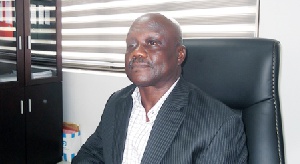His name is Professor Newman Kwadwo Kusi: He is the Executive Director of Dr. Kwabena Dufuor's Institute of Fiscal Studies (IFS) and, he was a Special Advisor to Dr. Dufuor when the later was the Minister of Finance and Economic Planning, in the National Democratic Congress (NDC) government.
Dr. Kusi had a special prayer for Ghana; and the prayer was that the International Monetary Fund (IMF) should find problems with Ghana during the first review of extended credit facility programme, so that, Ghana would not have the tranche of the cash the IMF was to dole out.
But, just as the Prophets of doom failed, Professor Kusi's prayer never came to pass and he has now had to recoil into his shell, pretending he'd never wished Ghana bad.
The IFS Executive Director, on April 7, 2015, said that Ghana will slip at the first review of the International Monetary Fund's extended credit facility program in November this year.
According to Professor Kusi, Ghana cannot meet some of the conditionalities under the program.
Among other things, he said, Labour Unions would reject efforts to cut expenditure by right-sizing the Civil Service, which is one of the main pillars of the program.
Interestingly, after the first review of Ghana's performance in the ongoing bailout programme, the International Monetary Fund (IMF) has scored Ghana high marks.
In his assessment, the leader of the IMF team, Joël Toujas-Bernaté, stated that, "the programme is on track, with all performance criteria met, except for the ceiling on Central Bank financing to the government which was technically missed by a small margin."
He said the IMF is pleased with government's commitment to the "ambitious fiscal consolidation and structural reforms programme, particularly, in addressing payroll irregularities, enhancing public finance management and transparency and liberalizing the oil distribution sector."
Toujas-Bernaté, however, pointed out that despite the impressive performance, more needs to be done to further enhance tax administration and eliminate tax exemptions to improve the revenue performance over the medium term.
In February this year, Ghana secured a US$940 million deal from the IMF to help the country turn around the ailing economy by helping to stabilise the cedi and reduce the fiscal deficit.
The IMF is set to release the second tranche after a successful review. With the prophecy backfiring, Prof. Kusi has resorted to trumpeting the criteria that the IMF said the Ghana government has missed by a small margin.
Prof. Kusi is now using that portion to make his 'prophecy' come to pass; but that is simply not working.
Prof. Kusi, under the guise of working with the IFS joined hands with IMANI Ghana to accuse the current Minister of Finance, Mr. Seth Terkper, of causing financial loss to state, by not pursuing a hedging programme that prevailed under Dr. Dufuor.
It later turned out that the issues raised by IFS and IMANI were not true.
It turned out that hedging was not stopped immediately Prof. Kusi's boss left office as the finance minister.
The two think-tanks created the impression that the hedging period under Dufuor was the best for Ghana.
In spite of the active implementation of the hedging programme in 2012, Ghana had one of the worst deficits, from which, the economy is still recovering.
The causes of the deficit included petroleum and other subsidies, as well as unpaid promissory notes and foreign exchange losses that should form part of a comprehensive assessment of a petroleum hedging programme
General News of Thursday, 9 July 2015
Source: The Inquisitor













